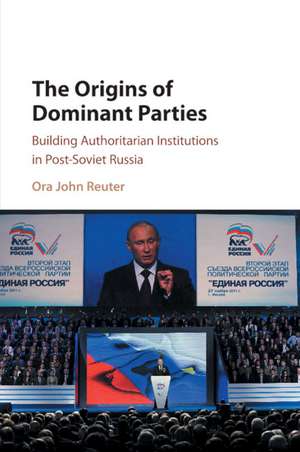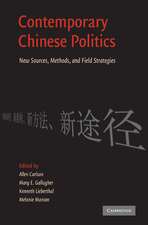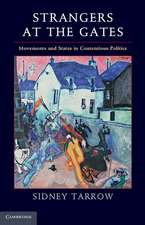The Origins of Dominant Parties: Building Authoritarian Institutions in Post-Soviet Russia
Autor Ora John Reuteren Limba Engleză Paperback – 9 ian 2019
| Toate formatele și edițiile | Preț | Express |
|---|---|---|
| Paperback (1) | 285.40 lei 43-57 zile | |
| Cambridge University Press – 9 ian 2019 | 285.40 lei 43-57 zile | |
| Hardback (1) | 515.13 lei 43-57 zile | |
| Cambridge University Press – 26 apr 2017 | 515.13 lei 43-57 zile |
Preț: 285.40 lei
Nou
Puncte Express: 428
Preț estimativ în valută:
54.66€ • 56.31$ • 45.79£
54.66€ • 56.31$ • 45.79£
Carte tipărită la comandă
Livrare economică 24 februarie-10 martie
Preluare comenzi: 021 569.72.76
Specificații
ISBN-13: 9781316622926
ISBN-10: 1316622924
Pagini: 330
Ilustrații: 19 b/w illus.
Dimensiuni: 150 x 230 x 16 mm
Greutate: 0.45 kg
Editura: Cambridge University Press
Colecția Cambridge University Press
Locul publicării:New York, United States
ISBN-10: 1316622924
Pagini: 330
Ilustrații: 19 b/w illus.
Dimensiuni: 150 x 230 x 16 mm
Greutate: 0.45 kg
Editura: Cambridge University Press
Colecția Cambridge University Press
Locul publicării:New York, United States
Cuprins
1. Introduction; 2. A theory of dominant party formation; 3. False starts: the failure of pro-Presidential parties under Yeltsin; 4. The emergence of a dominant party in Russia; 5. United Russia as the dominant party; 6. United Russia and Russia's governors; 7. Economic elites and dominant party affiliation; 8. Dominant party emergence around the world; 9. Conclusion.
Recenzii
'Reuter's impressive The Origins of Dominant Parties significantly revises our understanding of the United Russia Party's role in Russian politics. While many dismiss the party as little more than a shell held in place solely by Putin's personal appeal, this book shows that it plays a much more important role in Putin's regime than most experts currently think. This will be the go-to book for anyone wanting to know about United Russia, and essential reading for understanding Russian politics in the Putin era.' Henry Hale, George Washington University, Washington DC
'It comes as no surprise that autocratic leaders have incentives to create or govern with a ruling party since the institution is so helpful in promoting stability. But Reuter reminds us that ruling parties do not emerge through the efforts of leaders alone. They result from the decisions of hundreds of individual elites to link their fates to this institution. Why would they do so? The Origins of Dominant Parties provides a wealth of material on Russia in addition to cross-national evidence to show the conditions under which elites join ruling parties. Reuter convincingly shows that the formation of a dominant party is never a foregone conclusion, but instead is a dynamic process that relies on actors' relative power and their ability to solve problems of commitment and collective action.' Jennifer Ghandi, Emory University, Atlanta
'Based on extensive fieldwork and deep knowledge of the case, Reuter's deftly written story of the ups and downs of party-building in the post-Communist era is the definitive account of the construction of Russia's ruling party. Just as importantly, his argument that it takes a delicate balance of elite and leadership incentives to build a dominant party is a major contribution to our understanding of contemporary dictatorships. This book is a must-read for students of authoritarianism throughout the world.' Graeme Robertson, University of North Carolina, Chapel Hill
'It comes as no surprise that autocratic leaders have incentives to create or govern with a ruling party since the institution is so helpful in promoting stability. But Reuter reminds us that ruling parties do not emerge through the efforts of leaders alone. They result from the decisions of hundreds of individual elites to link their fates to this institution. Why would they do so? The Origins of Dominant Parties provides a wealth of material on Russia in addition to cross-national evidence to show the conditions under which elites join ruling parties. Reuter convincingly shows that the formation of a dominant party is never a foregone conclusion, but instead is a dynamic process that relies on actors' relative power and their ability to solve problems of commitment and collective action.' Jennifer Ghandi, Emory University, Atlanta
'Based on extensive fieldwork and deep knowledge of the case, Reuter's deftly written story of the ups and downs of party-building in the post-Communist era is the definitive account of the construction of Russia's ruling party. Just as importantly, his argument that it takes a delicate balance of elite and leadership incentives to build a dominant party is a major contribution to our understanding of contemporary dictatorships. This book is a must-read for students of authoritarianism throughout the world.' Graeme Robertson, University of North Carolina, Chapel Hill
Notă biografică
Descriere
This book asks why dominant political parties emerge in some authoritarian regimes, but not in others, focusing on Russia's experience under Putin.
















